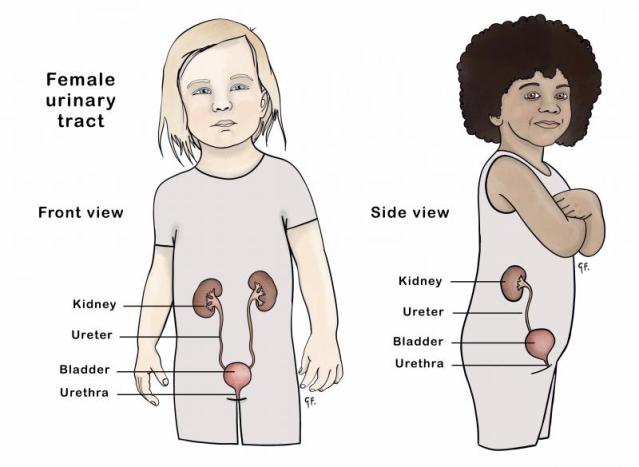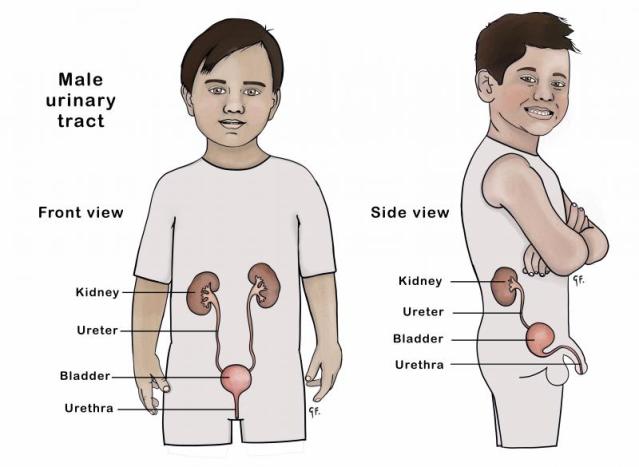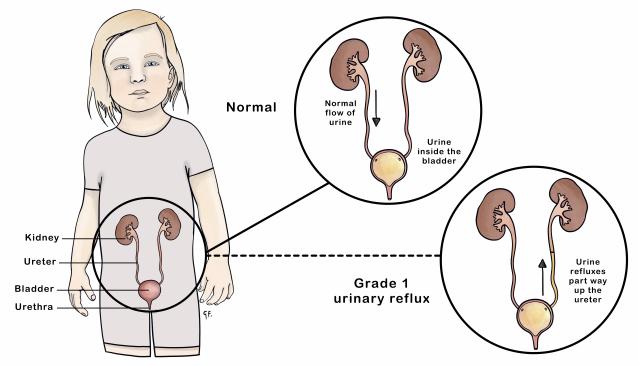Key points about urinary reflux
- urinary reflux is also called vesico-ureteric reflux
- it is the abnormal flow of urine back up the tubes (ureters) to the kidneys when a child does a wee
- if a baby or child has urinary reflux, they may be at risk of urinary tract infections (UTIs)
- repeated UTIs may cause scarring and damage to kidneys
- it is important to watch out for the signs of a UTI in your child with urinary reflux
- if you suspect that your child may have a UTI, go to a health professional for a urine test
- in most tamariki (children), urinary reflux gets better as they grow
It may help to read this together with the following pages.
Urinary Tract Infection In Children
The urinary tract and how it works
The urinary tract is the kidneys, ureters, bladder, and urethra.
The kidneys filter and remove waste and water from the blood to produce urine. The urine travels from the kidneys down 2 narrow tubes called the ureters. The urine is then stored in the bladder.
When your child does a wee, urine flows out of the body through the urethra, a tube at the bottom of the bladder. The opening of the urethra is at the end of the penis in boys and in front of the vagina in girls.

Front and side view of the female urinary tract.

Front and side view of the male urinary tract.
What is urinary reflux?
Urinary reflux is the abnormal flow of urine back up the ureters towards the kidneys when a child does a wee. This can happen because the ureters may not close off when urine is being squeezed out of the bladder when your child does a wee. Normally when the bladder empties, all the urine flows out of the bladder through the urethra.

Urinary reflux can be from grades 1 to 5. Grade 1 is the mildest form, while grade 5 is the most severe.

Check some diagrams showing the different grades of urinary reflux.
Signs and symptoms of urinary reflux
Urinary reflux does not cause any symptoms in affected pēpi (babies) or tamariki. The most common sign of urinary reflux is a UTI.
If your child has urinary reflux, it is important to watch out for the signs of a UTI in your child.
If you suspect that your child may have a UTI, go to a health professional for a urine test.
Another sign of urinary reflux is a widened (dilated) urinary tract. An ultrasound scan can show this. Sometimes, an ultrasound scan in pregnancy can show this before a baby is born.
Diagnosing urinary reflux
There are a variety of tests your health professional may request to diagnose urinary reflux and assess the condition of your child's kidneys and drainage tubes.
See the following KidsHeallth pages for information about these tests.
Micturating Cysto-Urethrogram (MCU)
Possible complications of urinary reflux
Urinary reflux may increase the chance of your child getting UTIs because of the incomplete drainage of urine.
Urinary reflux alone does not usually cause kidney damage. But, recurrent UTIs in tamariki with urinary reflux may cause kidney damage and scarring and can affect how well the kidneys work.
Only a small proportion of tamariki with urinary reflux develop significant kidney problems. In most tamariki, the problem is easily managed with appropriate treatment and monitoring.
Managing urinary reflux
Urinary reflux usually gets better by itself as your child grows, especially if it is mild.
The treatment aims to prevent UTIs while your child is young, when they can cause damage to the kidneys. Sometimes, the health professional may prescribe a small dose of antibiotics to prevent UTIs until the urinary reflux improves or gets better by itself.
In most tamariki, no treatment is necessary and your child's health professional will monitor the growth and health of your child's kidneys with scans. This will depend on how severe your child's reflux is.
Regular urine tests may be necessary to make sure there is no infection present. If your child develops any symptoms of a UTI while on antibiotics, take them to a health professional for an immediate urine test.
Will my child need long-term follow up for urinary reflux?
In most tamariki, urinary reflux gets completely better in childhood and they have no future problems.
Urinary reflux sometimes happens with abnormal development of the kidneys resulting in a condition known as dysplasia. Kidney dysplasia causes reduced function in the affected kidney. If your child has urinary reflux and dysplasia, their health professional will measure their blood pressure every year.
Tamariki who have severe reflux and repeated UTIs may also develop kidney damage and need further monitoring.
Acknowledgements
All illustrations by Dr Greta File. Property of KidsHealth.
